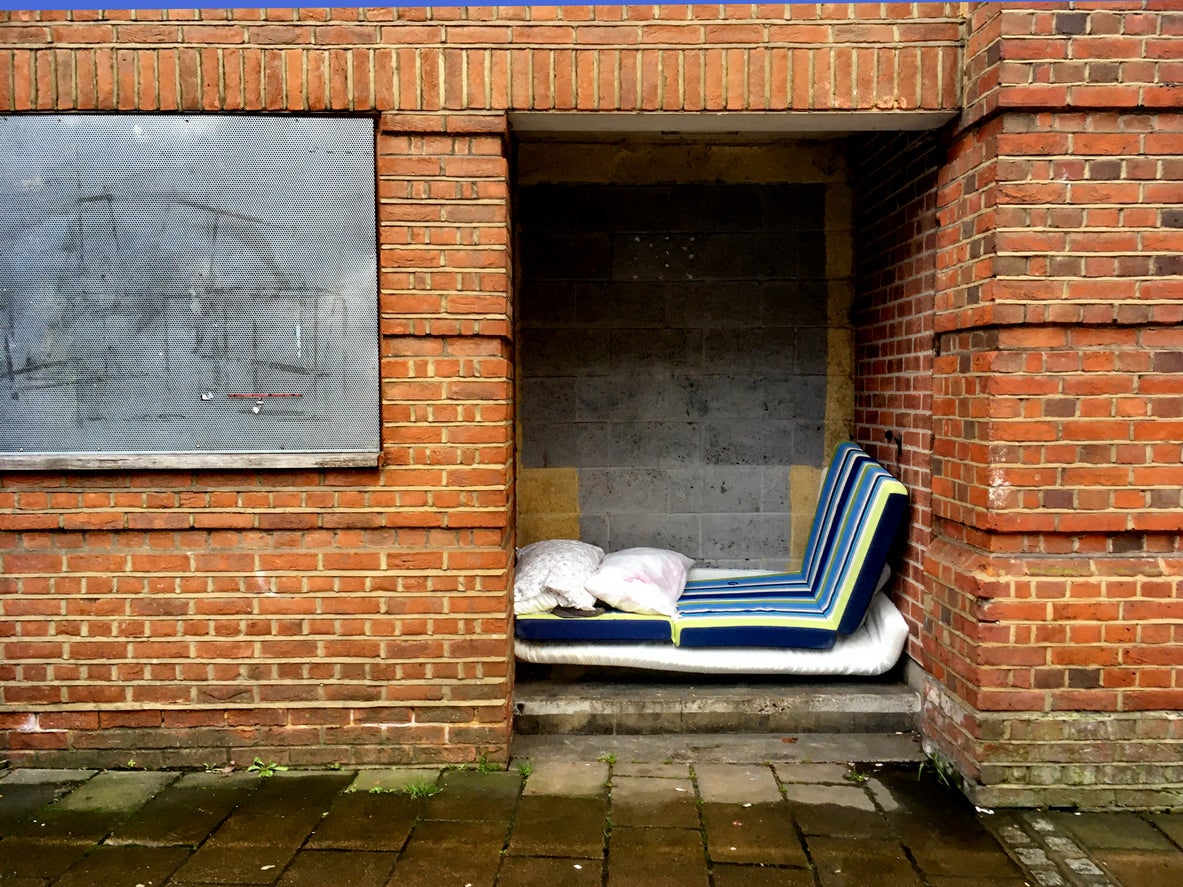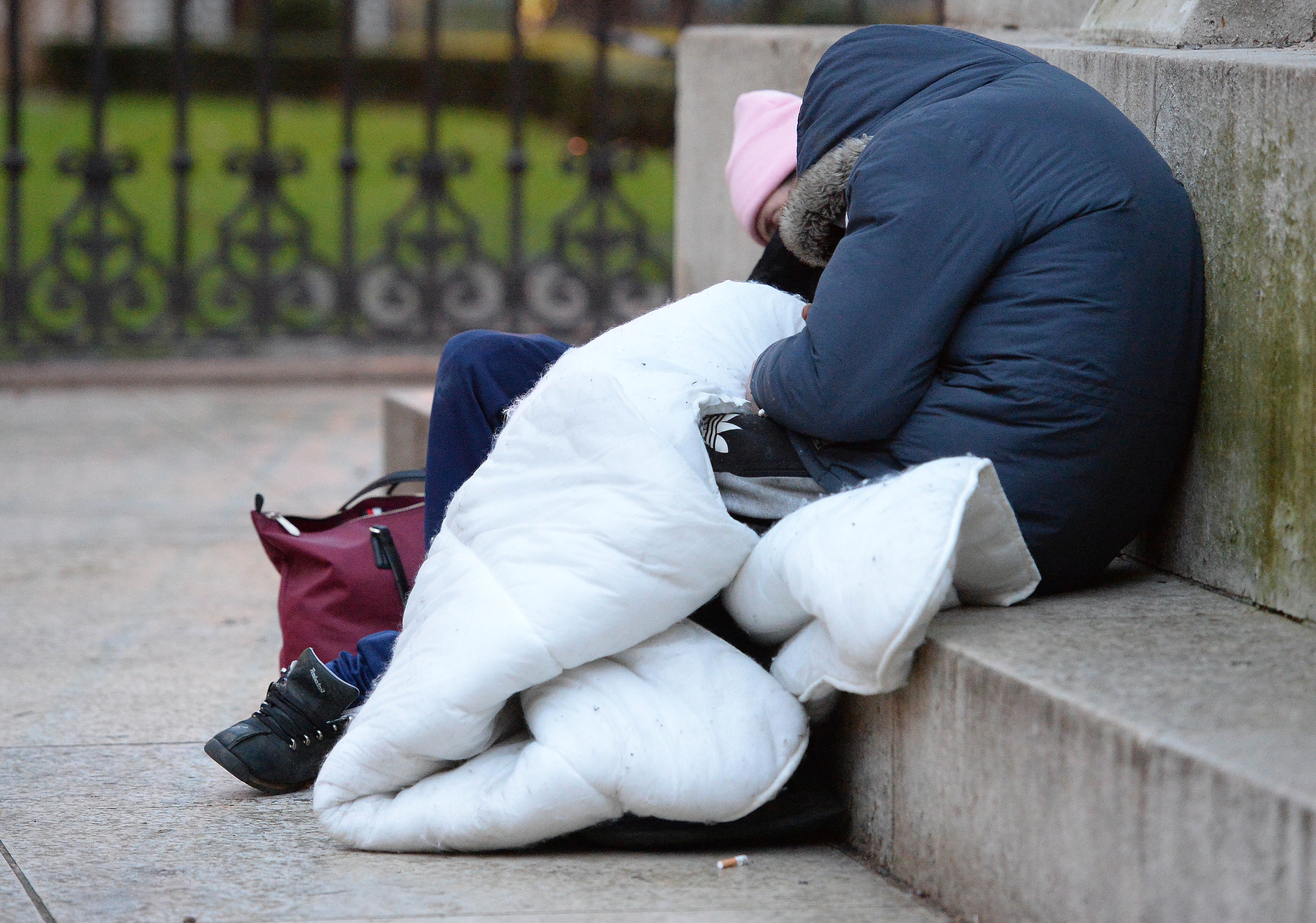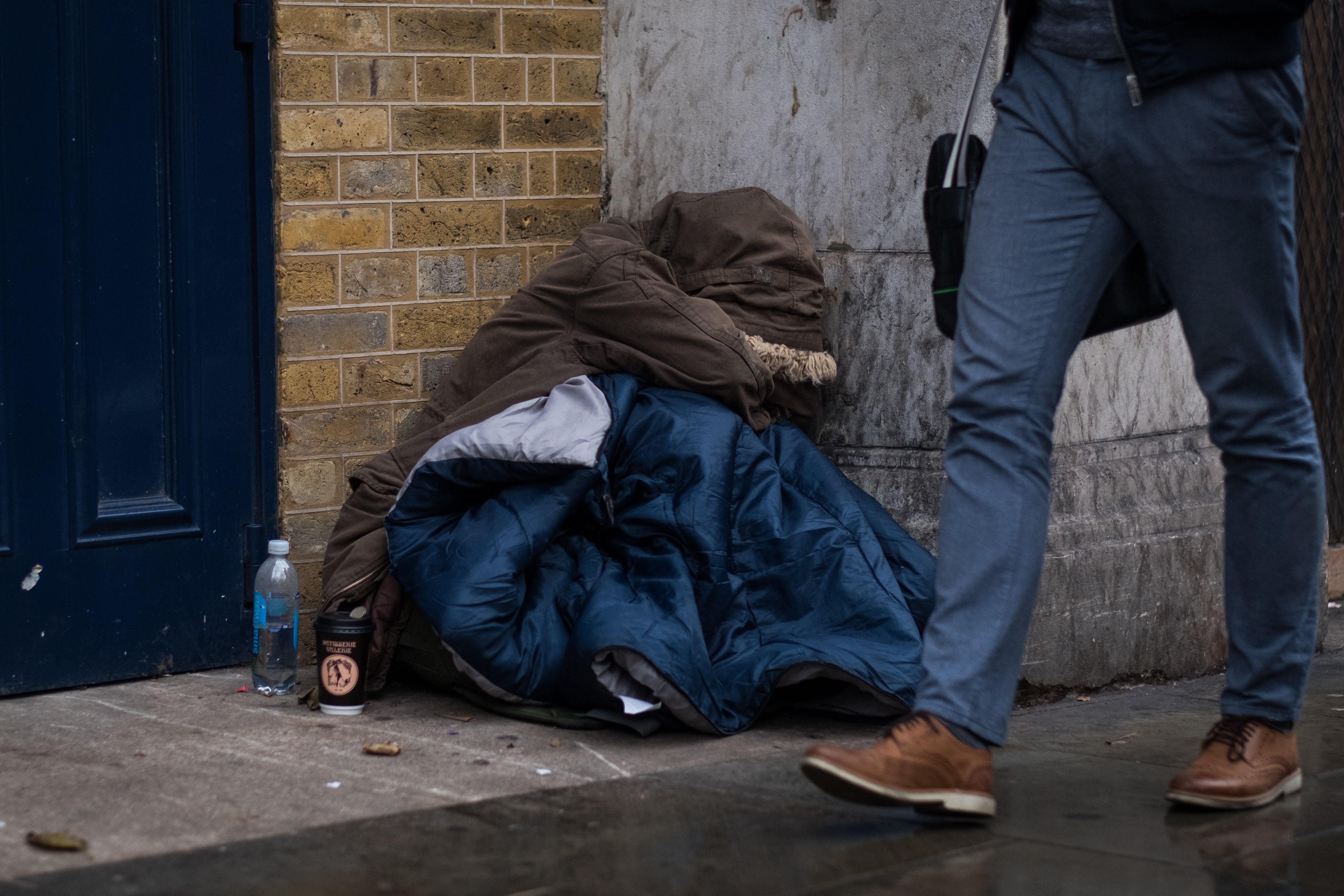Homeless people told to sleep on streets first if they want housing help
The situation has been branded ‘unacceptable’ by campaigners and MPs, with those who are afraid to sleep rough missing out on support

Your support helps us to tell the story
From reproductive rights to climate change to Big Tech, The Independent is on the ground when the story is developing. Whether it's investigating the financials of Elon Musk's pro-Trump PAC or producing our latest documentary, 'The A Word', which shines a light on the American women fighting for reproductive rights, we know how important it is to parse out the facts from the messaging.
At such a critical moment in US history, we need reporters on the ground. Your donation allows us to keep sending journalists to speak to both sides of the story.
The Independent is trusted by Americans across the entire political spectrum. And unlike many other quality news outlets, we choose not to lock Americans out of our reporting and analysis with paywalls. We believe quality journalism should be available to everyone, paid for by those who can afford it.
Your support makes all the difference.Hundreds of homeless people are being told by councils to sleep on the streets first if they want housing help under opaque government rules, The Independent has learned.
Charities say the guidance used to assess people asking for accommodation is resulting in some being turned away at the housing office and told to “bed down” on the streets so they can be picked up by outreach teams.
The situation – branded “appalling” and “utterly unacceptable” by campaigners and MPs – also means that people who are afraid to sleep on the streets are sometimes not picked up by rough sleeping teams at all, with women who fear being sexually assaulted particularly affected.
Housing charity Shelter says the problem is systemic, and that its helplines frequently hear from people who are left without accommodation because they cannot be “verified” as rough sleepers by their local authority – including during the Covid lockdown, when they were supposed to be offered a place to stay under the “Everyone In” scheme.
Even those who do bed down on the street are sometimes missed by the overstretched and under-resourced council teams who are supposed to find them and take them in. The approach varies by local area, with government guidance on the matter opaque.
Labour said the government should step in to make clear that people should not be left until they are desperate to be offered help.
“No one should have to render themselves destitute before they’re able to access support,” Sarah Owen, the shadow minister for homelessness, told The Independent. “People should be able to get help before they reach crisis point so we can protect some of the most vulnerable of rough sleepers, particularly women.

“In a caring country like ours, nobody wants to see anyone sleeping on the streets. Yet this government’s record on tackling homelessness is shameful.”
The Independent’s Homeless Fund campaign has supported homelessness projects in Britain for two years – culminating in November with the opening of central London’s first 24-hour homeless women’s drop-in centre.
The government says councils use “a range” of approaches to determine who should be offered help, but charities say the government’s guidelines must be changed so that it is clear people do not need to be “verified” as rough sleepers before being offered emergency accommodation.
Among the cases documented by Shelter was that of a man in Greater Manchester, who approached his local council to make a homeless application but was not offered accommodation – he was eventually told to walk into the town centre and wait to be picked up by the outreach team so he could be verified as a rough sleeper.
But the man suffered from severe back pain, and so was unable to bed down on the street. Instead he spent the night in a van before charity workers intervened on his behalf.
In another case, a man in southwest England who developed Covid symptoms while sleeping on an acquaintance’s sofa was asked to leave, and was left wandering the streets during the pandemic because his local council was not satisfied he was actually homeless.
And a man in London, who contacted his local authority, police and the Streetlink service for accommodation at the start of the first national lockdown, was turned away because he had been sleeping on night buses and at Heathrow airport as well as wandering the streets.
Again, his situation meant he could not be “verified” by the local authority as sleeping rough, and he was only found accommodation after the threat of legal action by Naccom, a coalition of charities that helps people in need of accommodation.

Polly Neate, Shelter’s chief executive, told The Independent: “Sadly, our housing emergency means countless people who lose their home end up on the streets because they have nowhere else to go.
“So, it is beyond belief that people who are already facing the horror and danger of sleeping rough are only classified as being street homeless if they are bedded down outside at night.
“‘Everyone In’ undoubtedly got thousands of people off the streets, but not everyone was helped. And worryingly, some councils were advising people to sleep on the street in order to access support. It’s no surprise some people were understandably too frightened to do this. It is appalling people were asked to put themselves at risk in order to get a roof over their heads.”
Under the government’s Homelessness Reduction Act, councils have a legal duty to prevent homelessness – but their budget grants from central government have been cut by 37 per cent over the last decade, meaning resources are constrained. Councils are also restricted by central government in how much they can raise council tax. The combined effect of these rules has led to a sharp cut in services.
A spokesperson for the Streetlink service, which connects local authorities with people who need housing help, told The Independent: “Streetlink was originally intended as a means for the public to alert authorities to someone rough sleeping who needed support. It is also possible for people who are sleeping rough to refer themselves, but people should never be encouraged to sleep rough in order to access support.
“Local outreach services often go out overnight or early in the morning, as this is the most effective way of finding people sleeping rough, with StreetLink alerts aiming to help with this already-established process. This can mean that certain people who feel too vulnerable to ‘bed down’ overnight can be missed.”
Liberal Democrat MP Layla Moran, who is campaigning to scrap the 1824 Vagrancy Act, said the “Everyone In” policy should be made permanent and no-fault evictions should be banned.
“It is utterly unacceptable that people who end up without somewhere to live are being told they need to sleep on the streets if they want to receive any help from the government. Despite consistent promises to end rough sleeping, official advice like this is only making the problem worse,” she told The Independent.
“Vulnerable people, particularly women, are scared and need to know that help is available when they need it – otherwise the number of hidden homeless will continue to grow and many will go without any support at all.
“If the Conservatives actually cared about tackling homelessness they would be doing everything they could, but instead they are part of the problem.”
Asked about the government’s guidance to councils on verifying rough sleepers, a spokesperson for the Department for Levelling Up, Housing and Communities said the government was “committed to ending rough sleeping for good” and that the “Everyone In” scheme during the national Covid lockdown had helped 37,000 people off the streets.
The spokesperson added: “Councils can use a range of tools to identify those who need help, which include Streetlink, and we have provided them with considerable funding to ensure support is in place to protect vulnerable people. We are also investing more than £2bn over the next three years to tackle rough sleeping.”
Join our commenting forum
Join thought-provoking conversations, follow other Independent readers and see their replies
Comments